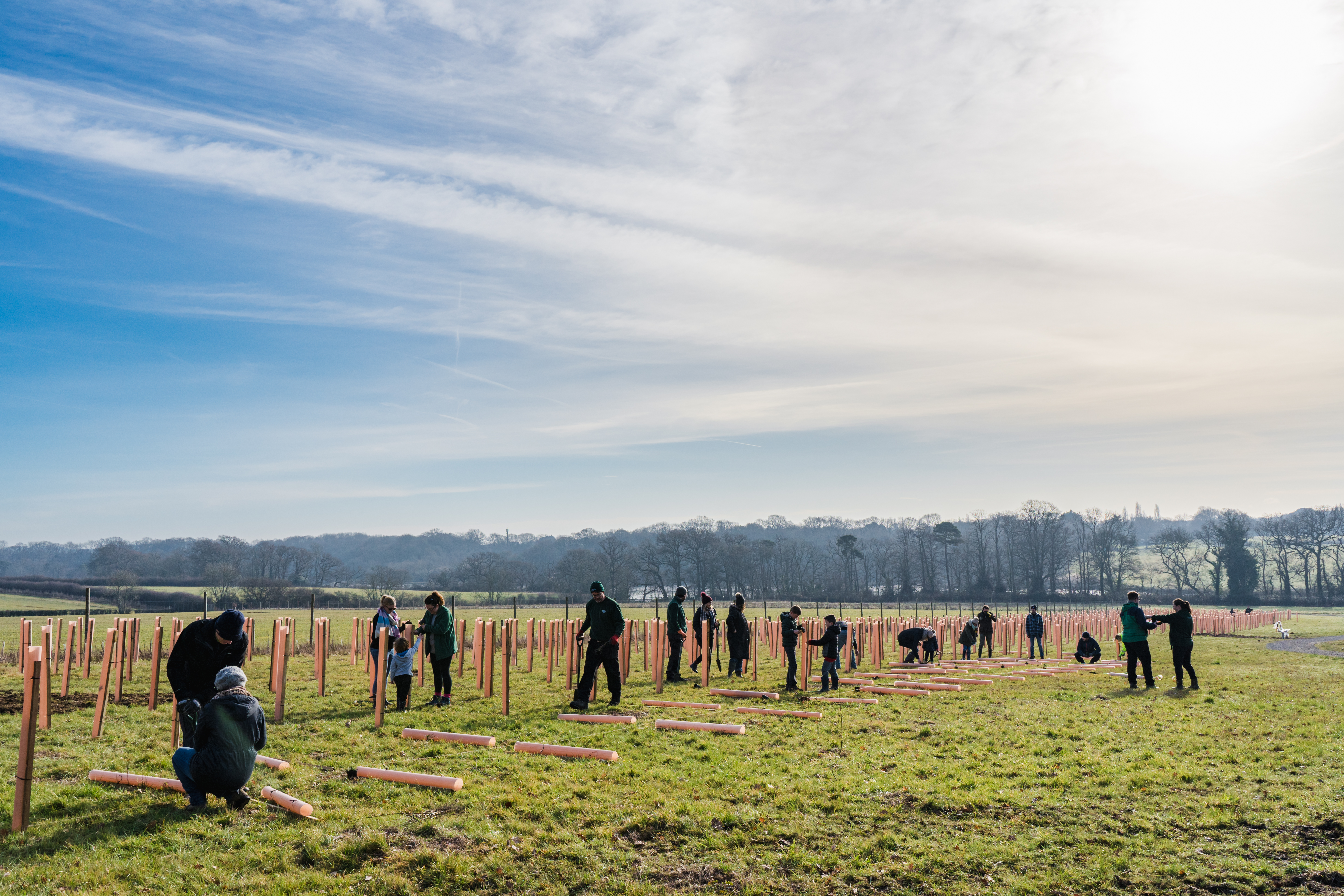Introduction
Hampshire County Council has been collaborating with a range of local communities, councils, and landowners to deliver nature recovery activities across the County.
Background
Nature recovery and green infrastructure became central to Hampshire County Council’s agenda after the Hampshire 2050 Commission of Inquiry. The Inquiry ran from May 2018 to October 2019, and identified a framework for the Council’s future plans, strategies and frameworks. During this time a climate emergency was also announced in June 2019, which set targets for the Council to be carbon neutral by 2050 and to prepare for resilience to the impacts of a two degree temperature rise.
The Commission’s final report recognised climate change and the changing environment as two of the most important drivers and strategic priorities for the County Council. Hampshire County Council produced a Climate Change Strategy in 2020 in response to the Commission’s report which sets priorities for reducing emissions and improving the resilience of the county.
Timeline
The projects
Community-led pollination
In 2020 Hampshire County Council’s Countryside Service established the Parish Pollinator Pledge to empower local parishes to understand their local habitats and consider how they can act to promote nature recovery within their communities, with a particular focus on pollinating insects.
As part of the Pledge local councils and community groups are encouraged to undertake a species and habitat survey through mapping to record information within their parish. Once the surveys are completed, parishes then create a Local Action Plan for pollinators. To start the project, Hampshire County Council completed a series of pilots to give parish councils and community groups the skills to identify the pollinator habitats in their area and decide how to best manage them.
Working directly with communities to promote Hampshire’s projects has proved invaluable to encouraging greater volunteer-led actions. For example, Hampshire County Council have provided local parish councils and community groups with training and equipment to allow them to focus their parish events and activities on supporting pollinators. For example, Buriton Parish Council left a strip of their recreation ground uncut for the summer, cutting the area in late summer. They then invited the community to help with raking up the cuttings. Over 50 people arrived to help with this task as part of their parish Hay-Day.
Local districts and carbon sequestration
Hampshire County Council completed a complex mapping project over two years from April 2020 to May 2022 which included developing the methodology and identifying areas where carbon was stored across the Council’s estate.
The mapping used habitat, land-type and land use data to estimate the current carbon storage of the Council’s landholdings, as well as estimate current levels of carbon dioxide sequestration. The data has been used to consider and understand Hampshire County Council’s potential to mitigate for climate change. For example, the mapping found that natural and semi-natural habitats in the Council’s ownership form only around 60% of their landholding but provide over 99% of the total carbon dioxide sequestration for the whole estate.
This work was carried out in partnership with the Hampshire Biodiversity Information Centre (HBIC). This mapping methodology is now being adopted by others and HBIC has been asked to map some of the District Council areas in Hampshire.
Landowners and farm clusters
Hampshire County Council have emphasised the importance of collaboration with landowners and its membership within existing farm clusters helps facilitate this.
One of the largest farm clusters is the Martin Down Supercluster which is located across the boundaries of Hampshire and Dorset, surrounding the Martin Down National Nature Reserve (NNR). The cluster contains a group of farmers, including Hampshire County Council as a landowner, who meet regularly to discuss and take forward actions to conduct baseline surveys, improve and restore natural habitats, monitor species, and promote conservation efforts.
The principle of NNRs within nature recovery is that they will act as the reservoir for biodiversity and Hampshire County Council will work with neighbours to spread often declining biodiversity back out into the wider landscape. Landowners within these farm clusters are often at the forefront of nature recovery within the wider landscape.
Challenges and solutions
Project participation
One of the challenges involved in Hampshire County Council’s nature recovery efforts was how to increase project participation. For example, they wanted to empower more local parishes to sign up to the Pollinator Project.
The solution to this has been to facilitate networking between parish councils and build connections between community groups. For example, they are supporting networking sessions for meetings between Buriton, Selbourne and 15 other Parish Councils, delivering guidance and nature recovery and how to engage residents in active delivery
Strategic working across departments
Hampshire County Council recognises that the consolidation of projects both across council departments and between members and officers can be challenging. To break down these barriers, two large departments in the Council amalgamated in January 2023 with the economic, transport and environment department combining with culture and community.
This greater interaction between departments aims to facilitate the development of the Local Nature Recovery Strategy and incorporate the health and wellbeing opportunities that natural recovery could provide for the County.
Impact
Heightened council-wide recognition of nature recovery
Hampshire County Council found that the projects they have undertaken have increased awareness, both in the Council and local community, of the importance of nature recovery, which has resulted in further funding being allocated for the work. Hampshire County Council is now drafting a Pollinator Strategy to identify future actions and funding opportunities to continue this work. They have also employed a specific Pollinator Officer through existing climate change funding who started in early 2023 for 18 months to continue this work.
They also highlight that the nature recovery projects, including the pollinator project have had large impacts but have been relatively low-cost to undertake and co-ordinate and delivered by a relatively small team of Environmental Officers.
Diversifying nature recovery opportunities to deliver climate ambition targets
Previously, Hampshire County Council has been commended for their tree-planting efforts. This emphasis on the role of trees to benefit biodiversity levels and carbon capturing is continuing through their Tree Strategy but Hampshire County Council is also looking at how habitat management and restoration can enhance carbon dioxide sequestration rates, through activities such as tree and hedgerow planting, restoring species rich grassland and protecting peat deposits.
The mapping of high carbon areas throughout the County provided an opportunity to explore how nature recovery could be used to help meet their climate change targets, as well as explore the benefits of other nature-based solutions such as natural flood management, water quality, soil health and natural health and wellbeing.


